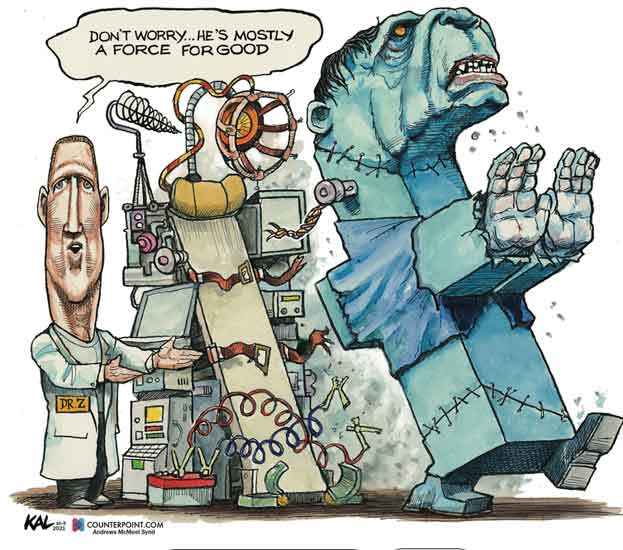
Meta's company-funded oversight body ruled Wednesday that the social media giant shouldn't automatically take down posts using the phrase "from the river to the sea," a decades-old rallying cry for Palestinian nationalism that has reignited a national debate about the boundaries of acceptable speech.
Meta's Oversight Board, an independent collection of academics, experts and lawyers who oversee thorny content decisions on the platform, said posts they examined using the phrase didn't violate the company's rules against hate speech, inciting violence or praising dangerous organizations.
"While [the phrase] can be understood by some as encouraging and legitimizing antisemitism and the violent elimination of Israel and its people, it is also often used as a political call for solidarity, equal rights and self-determination of the Palestinian people, and to end the war in Gaza," the board said in its ruling.
Meta spokesman Corey Chambliss said in a statement that it welcomes the board's review. "While all of our policies are developed with safety in mind, we know they come with global challenges and we regularly seek input from experts outside Meta, including the Oversight Board," he said.
The political clash over the Israel-Gaza war has forced the company to closely examine the line between supporting free expression
and suppressing dangerous hate speech online, and Wednesday's ruling may fuel tensions. Some Jewish groups have accused the social media giant of allowing antisemitism to surge on its networks in the wake of Hamas's Oct. 7 attack on Israel that ignited the war.
Meta has also been lambasted by digital rights activists and pro-Palestinian groups, which say it has stifled legitimate political critiques of the Israeli government and its armed forces during a war that has claimed more than 40,000 Palestinian lives, according to the Gaza Health Ministry, and displaced much of the population.
Activists and pro-Palestinian demonstrators have used the phrase "from the river to the sea" to express their support for Palestinians in Gaza and the Israeli-occupied West Bank. The slogan, which is often followed by the phrase "Palestine will be free," refers to the territory between the Jordan River and the Mediterranean Sea including the state of Israel. But others have interpreted the phrase as a call to eradicate Israel, with some Jewish American organizations arguing that the phrase amounts to antisemitism.
The board reviewed three cases where the phrase appeared on the platform, including a comment on a Facebook video that had a "FromTheRiverToTheSea" hashtag along with #DefundIsrael and heart emojis in the colors of the Palestinian flag. In another instance, a user posted an image of floating watermelon slices - a stand-in for the Palestinian flag - to form the phrase, alongside the comment, "Palestine will be free.
In all three cases, social media users appealed to Meta to remove the content but the company decided to leave the material up. Those users then appealed to the board.
According to the board, the posts don't specifically attack Jewish or Israeli people "with calls for violence or exclusion," putting them outside the company's definition of hate speech. The board also said the cases didn't break the company's rules against inciting violence or praising dangerous organizations or individuals because they don't glorify Hamas or its actions. Rather, the selected cases show that the phrase was being used in solidarity with Palestinians, the board argued.
A minority of the board disagreed with the decision. While the individual cases don't violate company policy, the contingent argued that Meta should assume the phrase glorifies Hamas and remove it by default. Hamas is on Tier 1 of Meta's list of dangerous organizations and individuals, and the company bars explicit praise or glorification of the groups's attacks on social networks.
The decisions the Oversight Board makes on specific cases are considered binding.
For nearly a year, Meta has faced scrutiny over how it has handled content about the Israel-Gaza war. Soon after the war broke out last year, throngs of Palestinian supporters complained that Meta suppressed their content commenting on or documenting the violence. In July, the company announced it would remove more speech targeting "Zionists" where the word seemed to be a stand-in for Jews and Israelis and included dehumanizing comparisons, calls for harm or denials of existence.
Meta also referred a bundle of cases in which the term Zionist appears to be being used as a proxy along with comparisons to criminals, such as the phrase "Zionists are war criminals." A ruling in those cases is pending.
Since the Oversight Board's inception four years ago, it has faced criticism that it moves too slowly to make decisions, while others have questioned its price tag and political relevance. This year, the board notified staffers that it would have to lay off workers amid widespread cutbacks across the technology sector.
But in recent months, the Oversight Board has sought to bolster its influence by taking on more frequent and bigger cases. The board's trust is also exploring setting up a separate center to handle an influx of user appeals for account restrictions that are required under Europe's Digital Services Act.


 Contact The Editor
Contact The Editor
 Articles By This Author
Articles By This Author